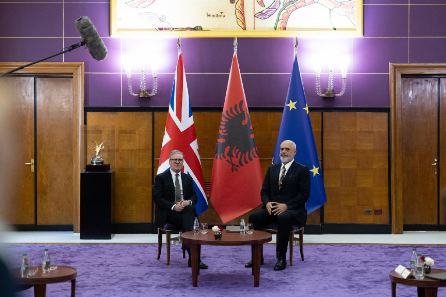Tirana, Albania — In a landmark visit marking the first-ever bilateral trip of a British Prime Minister to Albania, Keir Starmer met with his counterpart Edi Rama in Tirana, ahead of the sixth European Political Community Summit. The meeting, however, was overshadowed by persistent questions on one of Europe’s most controversial issues: migration management.
Addressing speculation over a potential UK-Albania agreement on migrant processing—akin to Albania’s much-debated deal with Italy—Prime Minister Rama was unequivocal. “I’ve been clear since day one,” he declared during a joint press conference. “There will be no second deal. The agreement with Italy stands alone, based on our unique relationship and geographic considerations.” Playfully, Rama added, “We are faithful to our marriage with Italy. Everything else is just a flirtation.”
Despite pressure from other nations to replicate the Italy model—whereby asylum seekers are hosted and processed in Albania—Rama stated firmly that such proposals have been rejected. “Many countries have asked, and we have said no,” he said, underscoring Albania’s geopolitical and diplomatic selectivity.
Meanwhile, Prime Minister Starmer took the opportunity to frame the UK-Albania partnership as “vital,” especially in curbing illegal migration and tackling cross- border criminal networks. “What we’ve done with Albania has worked,” he said. “We’ve returned over 24,000 individuals who entered illegally.
The previous government failed to manage the asylum system—many were left in limbo, wasting taxpayer money. That chaos ends now.” Starmer also praised joint UK-Albanian operations at the Port of Durrës earlier that day, which he witnessed firsthand. The visit, symbolically charged, emphasized enhanced cooperation in law enforcement and border security.
Rama, in turn, struck a tone of pride and defiance. “We’re proud of what we’ve achieved together. Let’s speak in facts, not myths,” he urged, directly addressing British media narratives that have often stigmatized Albanians. “In 2024, the number of Albanians attempting illegal entry into the UK is just a few hundred—down from 12,000 in 2022. The claim that one in 50 Albanians is in British prisons is a lie. The real number is one in 500.”
He further highlighted the recognition received by Albanian police from the UK Home Office, citing awards for operational excellence. “We didn’t win again last year—maybe to avoid making others jealous,” he joked, before pivoting to a more serious point: the need to address the status of Albanians living in the UK under Kosovo identities. “These people are fully integrated, yet live in bureaucratic limbo. After 20 years of contribution to British society, it’s time for a solution.”
The conference ended on a lighter economic note. “Our trade has increased by 27%, but it`s still smaller than the budget of Crystal Palace Football Club,” Rama quipped.
“We can, and must, do better.” For both leaders, the summit and this bilateral meeting represent a renewed alignment—strategically, economically, and symbolically. Yet, for now, Albania remains committed to a singular migration accord—faithful, in Rama’s words, to “its marriage with Italy.”
Written by our correspondent A.T.



